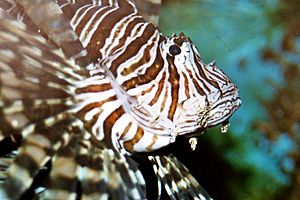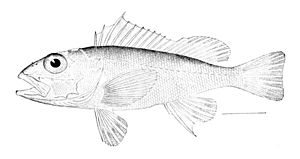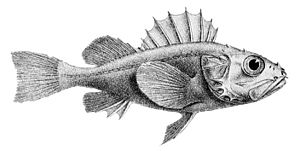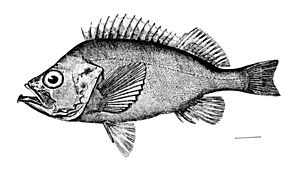Scorpaeniformes facts for kids
Quick facts for kids Scorpaeniformes |
|
|---|---|
 |
|
| Scorpaenidae: Pterois antennata | |
| Scientific classification |
|
| Kingdom: | Animalia |
| Phylum: | Chordata |
| Class: | Actinopterygii |
| Superorder: | Acanthopterygii |
| Order: | Scorpaeniformes Greenwood et al., 1966 |
| Type species | |
| Scorpaena porcus Linnaeus, 1758
|
|
| Suborders | |
|
Anoplopomatoidei |
|
The Scorpaeniformes are a large group of ray-finned fish. You might know some of them, like the cool lionfish! They are also sometimes called Scleroparei. This group is one of the five biggest orders of bony fish. It includes more than 1,320 different kinds of fish.
These fish are often called "mail-cheeked" fish. This is because they have a special bone on their cheek. This bone extends backward from below their eye. It connects to another bone near their gill cover. This unique feature helps identify them.
Scorpaeniform fish are carnivores, meaning they eat meat. They mostly munch on small crustaceans and other smaller fish. Most of these fish live on the ocean floor. They prefer waters that are not too deep. However, some types live in very deep water. Others can be found in the middle of the ocean, or even in fresh water.
These fish usually have spiny heads. Their pectoral and caudal fins are typically rounded. Most species are shorter than 30 cm (12 in). But the size can vary a lot! Some velvetfishes are only 2 cm (0.79 in) long when fully grown. On the other hand, the lingcod can grow up to 150 cm (4.9 ft) long.
One important group within the Scorpaeniformes is the Scorpaenoidei. These fish usually live in the benthic zone. This is the very bottom part of any water body, like oceans or lakes. The Scorpaenoidei group has two main parts.
The first part is the sea robins. These are divided into two families: the regular sea robins and the armored sea robins. A key difference is that armored sea robins have spine-covered plates. The regular sea robins do not have these plates.
The second part of the Scorpaenoidei group is the scorpionfishes. Scientists have identified twelve families of scorpionfishes. These fish also come in many sizes. The smallest ones are only about 2–3 cm long. The largest scorpionfishes can reach about 100 cm in length.
Fish Families
Scientists are still working out the exact number of families in the Scorpaeniformes group. There are usually between 26 and 35 different families.

Here are some of the main groups and families of Scorpaeniformes:
- Suborder Anoplopomatoidei
- Anoplopomatidae (like sablefish and skilfish)
- Suborder Cottoidei
- Superfamily Cottoidea
- Abyssocottidae (deep-water sculpins)
- Agonidae (poachers)
- Bathylutichthyidae
- Comephoridae (Baikal oilfishes)
- Cottidae
- Cottocomephoridae (Baikal sculpins)
- Ereuniidae (deepwater bullhead sculpins)
- Hemitripteridae (sea ravens)
- Icelidae (scaled sculpins)
- Psychrolutidae (fathead sculpins)
- Rhamphocottidae (grunt sculpin)
- Superfamily Cyclopteroidea
- Cyclopteridae (lumpsuckers)
- Liparidae (snailfishes)
- Superfamily Cottoidea
- Suborder Hexagrammoidei
- Hexagrammidae (greenlings)
- Suborder Normanichthyiodei
- Normanichthyidae (mote sculpin)
- Suborder Platycephaloidei
- Bembridae (deepwater flatheads)
- Hoplichthyidae (ghost flatheads)
- Parabembridae
- Peristediidae (armored searobins)
- Platycephalidae (flatheads)
- Suborder Scorpaenoidei
- Apistidae (wasp scorpionfishes)
- Aploactinidae (velvetfishes)
- Caracanthidae (orbicular velvetfishes)
- Congiopodidae (horsefishes and pigfishes)
- Eschmeyeridae
- Gnathanacanthidae (red velvetfish)
- Neosebastidae (gurnard scorpionfishes)
- Pataecidae (Australian prowfishes)
- Perryenidae (Whitenose pigfish)
- Plectrogenidae
- Scorpaenidae (scorpionfishes)
- Sebastidae (sea perches)
- Setarchidae (deep-sea bristly scorpionfishes)
- Synanceiidae (including the stonefishes)
- Tetrarogidae (waspfishes)
- Triglidae (searobins)
See also
 In Spanish: Escorpeniformes para niños
In Spanish: Escorpeniformes para niños



